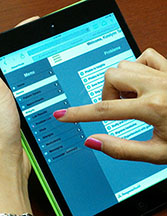Posted By Monique Dever On September 12, 2014
Patients like the convenience of mobile health but doctors are hesitant. Why?

The use of mobile technologies is exploding globally. Everyone seems to have a mobile phone or be using a computer with Wi-Fi. We all like the convenience of anytime, anywhere access. And now, Mobile Health, or mHealth as it is commonly referred to, is a top emerging trend in healthcare—but there’s an important debate going on.
Patients as well as healthcare organizations worry about how to use their mobile technology while ensuring HIPAA compliance (and rightly so). However, the federal government (via Meaningful Use standards for EHRs) has mandated that all patients must be able to access their select health information via the use of a secure patient portal. That means there is no choice but to embrace the technology. The only questions then become, how and when? We suggest your organization take some baby steps to learn how to benefit from mHealth technology.
First—what is mHealth?
- A term used for the practice of medicine and public health supported by mobile devices. It’s commonly used in reference to operating mobile devices such as mobile phones, tablet computers, etc. for healthcare.
- mHealth applications include the use of mobile devices for collecting community and clinical health data, delivery of healthcare information to practitioners, researchers and patients, and direct provision of care (via mobile telemedicine).
- mHealth is part of increasing use of eHealth as by the use of an Electronic Health Record (EHR) software for healthcare.
So what is the debate?
- Patients like the convenience and control that mobile technology provides. They want to be able quickly and easily communicate via electronic tools using the Internet.
- Doctors, however, are resistant to their loss of control. In fact, 42 percent worry that mHealth makes patients too independent, according to a study by PWC, a leading international consulting firm. To read more of the study’s findings, visit: http://www.pwc.com/gx/en/healthcare/mhealth/report-findings.jhtml.
How can your clinic benefit from mHealth?
- Reduce no-shows by automatically sending periodic patient appointment reminders from your EHR (say, one week and a few days before the appointment).
- Use the EHR patient portal to keep the patient informed and engaged, as defined by federal Meaningful Use standards. Reduce patient callbacks for normal lab results; send normal results via secure messaging. If results are normal, call patients to follow up. This reduces your staff workload—and “phone tag.”
- If you are a local health department, use mHealth to reach out to a targeted patient population(s) for specific communications—for example, to invite patients to come and get flu shots or Breast Cancer and Cervical Program (BCCP) exams or to conduct community health surveys.
- This can be particularly appropriate if you serve a younger population, as you can engage them by securely and efficiently using built-in EHR capabilities for email, phone and text.
How can you take advantage of mHealth?
- Don’t feel like you need to go all gung-ho with all kinds of mHealth initiatives. Take baby steps and experiment with implementing these technologies. Before you get started, work on developing appropriate organizational policies and procedures for the mHealth initiatives.
- Learn how the federal government ensures that EHR vendors meet all privacy and security requirements.
- Learn how your organization can achieve bottom-line benefits from mHealth while projecting a state-of-the-art, tech-savvy image.
Change is hard! But with mandates from the federal government and increased demand from patients, the environment is ripe for mHealth. And the benefits are clear. It’s time to investigate what this technology can do for your organization and then learn how to use it effectively and securely.